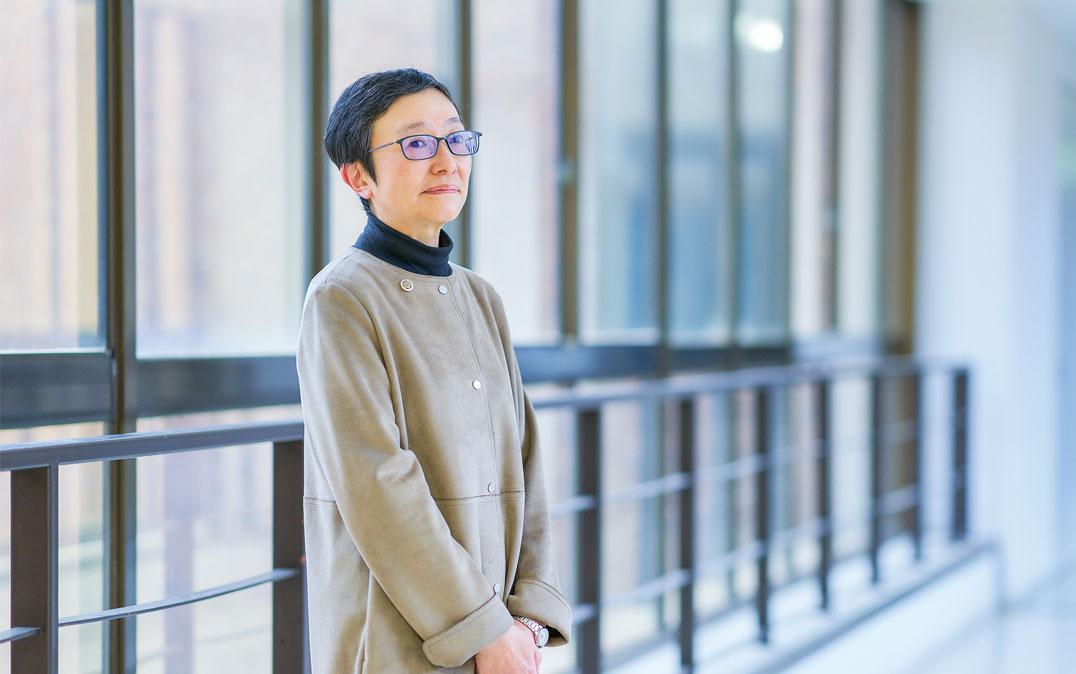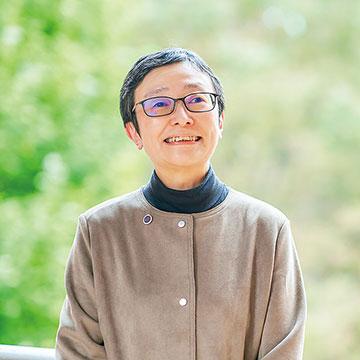TSUKUBA FRONTIER
#039 Addressing Diverse Social Challenges with Optimization: From Schedule Control to Community Planning
Professor YOSHISE Akiko, Faculty of Engineering, Information and Systems (From April 2023, Institute of Systems and Information Engineering)

Time frame scheduling—for classes, work shifts, and more—cannot be carried out at random.
A range of conditions is considered to avoid, for example, overlapping schedules for required courses, or excessive overtime in work schedules. The use of mathematical and statistical approaches to uncover optimal solutions under complex constraints is known as operations research.
Prof. Yoshise is developing state-of-the-art optimization algorithms and working on applications for diverse social issues in the real world.
Optimization enables society to function

Reproduction of an explanation of the introduction
of sigma symbols for high school students
There are many situations in our lives where schedules and staffing are carefully controlled while satisfying several constraints, such as home delivery systems, nurses' work shifts, and travel route exploration. Also, local developments are planned to be livable for everyone based on the characteristics of the area and the trends of the people who live there. Optimization methods support these systems. Though we may not realize it, such systems' smooth functioning makes a convenient, comfortable society possible.
The role of optimization is to maximize or minimize objectives while finding compromises between conditions that are not easily reconciled. As applied to society, optimization enables the most efficient utilization of resources like energy, information, services, and personnel. The conditions and options to be considered are input into a mathematical model, and an algorithm identifies optimum solutions as conditions are altered in small increments. This model-based approach allows for easy recalculation with changed conditions.
Optimizing solutions within the university
The University of Tsukuba established its new School of Comprehensive Studies in the 2021 academic year. As a centerpiece program of the university, it must operate smoothly. Students study a broad curriculum in their first year before moving on to an academic specialty and taking introductory courses in their chosen subject area. However, if all courses in each department are included in the curriculum, students may be unable to fit them into their timetables, or to take required courses because of overlapping time frames. It is challenging to create timetables that allow students to take all their desired courses.
Optimization is the solution to this challenging task. While reducing as much as possible the number of specialized introductory courses set by each department, Prof. Yoshise and her students designed a timetable optimization model that incorporates more than 10,000 constraints, including courses with specific enrollment order (such as beginner/intermediate/advanced) and faculty availability (days and times when courses can be offered). They also created a model to verify the feasibility of concurrent enrollment. As such, students can now apply to two schools in any combination.
Optimization is a process of using mathematics to calculate correctly, rather than prioritizing the opinions of specific individuals or making relationship-based adjustments. As a result, a sense of impartiality can be preserved even when constraints must be relaxed. This makes optimization extremely effective in solving highly public issues.
Working with high school students to address local challenges
Optimization algorithms are complex, but as tools, there are solvers (mathematical programs) that can address even large-scale challenges. Prof. Yoshise conducts annual classes that feature these tools for high school students, aimed at finding solutions to real problems in their communities.
For example, the municipal public address system in Ryugasaki suffered from an audio feedback problem that prevented residents from hearing public safety announcements during the Great East Japan Earthquake. To address this problem, the high school students divided the city into nearly 20,000 grid sections and examined each population under the guidance of Prof. Yoshise and her teaching assistants. They then calculated how to maximize the number of people the address system could reach while minimizing overall cost, with loudspeaker type and cost as variable constraints.
The high school students found that by changing the location of the loudspeakers without increasing their numbers, they could double the number of people able to hear the announcements. The city's 134 loudspeakers were sufficient, but the announcements were hard to hear because they were concentrated where many residents live.
Considering what conditions should be satisfied, it is necessary to know the local community well and think logically. Analyzing the problem in this way will lead to a logical answer. For high school students, participating in solving real problems and feeling a sense of achievement is a valuable experience.
Pursuing cutting-edge optimization theory
In the optimization field, a new algorithm called the interior-point method, published in 1984, attracted much attention. Prof. Yoshise was absorbed in it when she was a student. Some problems require advanced mathematics, but she enjoyed the challenge of trying something new, and has been pursuing cutting-edge optimization algorithms ever since.
With the development of excellent solvers, problem-solving itself is no longer difficult. But when algorithms change or the number of variables to be considered is significant, knowledge of mathematics becomes indispensable. In recent years, methods for transforming and restoring data that contain personal information, in such a way as to hide certain portions of the data while maintaining their original characteristics, have been approached as optimization problems. As computer performance advances and makes extensive data sets more manageable, optimization is becoming capable of addressing ever more diverse problems. The kinds of problems that can be solved through optimization are itself a subject of research.
Optimization themes are everywhere
Prof. Yoshise receives many requests from within and outside the university to solve problems with optimization. It is surprisingly complex, for example, to schedule master's theses presentations, because one must accommodate so many individual schedules. If you attempt to do this manually, the slightest change in conditions can wreak havoc. But if you create a model, you can solve new problems instantly. Prof. Yoshise's department is also involved in scheduling shared-ride municipal cabs operated by Tsukuba. Since self-driving cars may become increasingly prevalent in the not-so-distant future, demand for such optimization in the mobility field is likely to be considerable.
Optimization is a field with a wide range of applications, and because it can help solve real social problems, it also contributes broadly to society. Students in Prof. Yoshise's laboratory assist her, but they also acquire a sense of responsibility, and pay more attention to the university and society. As a result, they grapple with highly public themes with a sense of satisfaction and urgency.
Profile

Born in 1962 in Tsurumi Ward, Yokohama, Professor Yoshise holds Bachelor of Engineering (1985) and Doctor of Engineering (1990) degrees from the Dept. of Industrial Engineering and Management, Tokyo Institute of Technology. She has been engaged in theoretical and applied research in mathematical optimization. She became a Junior Assistant Professor at the University of Tsukuba in 1990, and Professor in 2007. She is a recipient of the INFORMS Computing Society Prize (1992) and the Frederick W. Lanchester Prize (1993) of the Institute for Operations Research and Management Sciences, and the Best Paper Award of the Operations Research Society of Japan (2007), among others.
(URL:https://infoshako.sk.tsukuba.ac.jp/~yoshise/index.htmlhttps://datasci.sk.tsukuba.ac.jp/en/)
Article by Science Communicator at the Bureau of Public Relations


